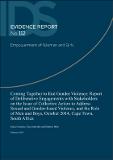| dc.contributor.author | Cornelius, R | |
| dc.contributor.author | Shahrokh, T | |
| dc.contributor.author | Mills, Elizabeth | |
| dc.coverage.spatial | South Africa | en |
| dc.date.accessioned | 2015-02-13T10:45:40Z | |
| dc.date.available | 2015-02-13T10:45:40Z | |
| dc.date.issued | 2015-02 | |
| dc.identifier.citation | Cornelius, R.; Shahrokh, T. and Mills, E. (2015) Coming Together to End Gender Violence: Report of Deliberative Engagements with Stakeholders on the Issue of Collective Action to Address Sexual and Gender-based Violence, and the Role of Men and Boys, October 2014, Cape Town, South Africa, IDS Evidence Report 112, Brighton: IDS | en |
| dc.identifier.uri | https://opendocs.ids.ac.uk/opendocs/handle/20.500.12413/5782 | |
| dc.description.abstract | Sexual and gender-based violence (SGBV) – physical, psychological, sexual, economic, socio-cultural – is a conspicuous and widespread violation of human rights. In South Africa, this violence pervades the political, economic and social structures of society and is driven by strongly patriarchal social norms and complex and intersectional power inequalities, including those of gender, race, class and sexuality. Gender inequality can therefore be understood as legitimating violence, as well as being further established by the use of such violence. Intervening in this relationship presents a complex challenge.
This report is based on one of three Department for International Development (DFID)-funded case studies carried out in 2014 at the Institute of Development Studies (IDS) through the Empowerment of Women and Girls Programme. The three countries covered were India, Sierra Leone and South Africa. A workshop drawing together the main findings across these countries will take place in February 2015 with the aim of developing a set of cross-cutting lessons and recommendations on ending SGBV through collective action, including by men and boys.
By placing a particular emphasis on alliance-based approaches in working towards social and gender justice, the South African case study, along with those conducted in India and Sierra Leone, sought to explore how collective action contributes to addressing the structural inequalities and discriminatory social norms that perpetuate SGBV, and the role of men and boys in enabling transformative change. | en |
| dc.description.sponsorship | UK Department for International Development | en |
| dc.language.iso | en | en |
| dc.publisher | IDS | en |
| dc.relation.ispartofseries | IDS Evidence Report;112 | |
| dc.rights.uri | http://creativecommons.org/licenses/by/3.0/ | en |
| dc.subject | Gender | en |
| dc.title | Coming Together to End Gender Violence: Report of Deliberative Engagements with Stakeholders on the Issue of Collective Action to Address Sexual and Gender-based Violence, and the Role of Men and Boys, October 2014, Cape Town, South Africa | en |
| dc.type | IDS Evidence Report | en |
| dc.rights.holder | IDS/Sonke Gender Justice/Sustainable Livelihoods Foundation | en |
| dc.identifier.ag | OT/11009/3/3/3/117 | |


